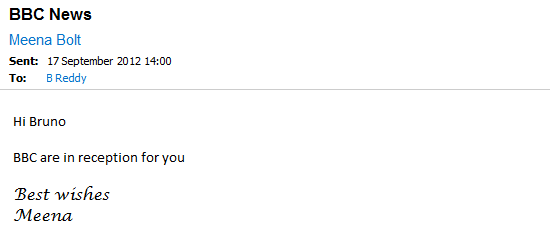“Hi Bruno, BBC are in reception for you.”

Well, there’s an email I didn’t think I’d ever receive.
Who could it be and why were they here to see me and not the headteacher? It can be strange what goes through my head. “I’m too young to meet Michael Aspel just yet. Pretty sure I’m not going to be asked to take Jake Humphries’ spot as an F1 presenter. And I’m too early for the Voice auditions.”
It turned out to be Sanchia Berg – “Oh – this must be something more high-brow”, thought I, “Maybe a Radio 4 piece on Exam-gate or maybe even…”
Newsnight
Today, news broke about Michael Gove’s announcement regarding the abolishment of GCSEs in favour of the EBacc qualification. It’s the biggest change to the UK’s assessment system since the introduction of GCSEs thirty years ago so it’s no wonder that the proposal got national attention and generated thousands of tweets, multiple headlines and scores of blog articles. The article on BBC News received over 1000 comments alone.
Newsnight ran the story too and chose to focus on the proposed increased intellectual demand of the EBacc. And it was Newsnight, specifically Sanchia Berg (their specialist on education), who was here to see me.
Sanchia’s line on this was around our state of readiness for the extra exam rigour. Is our teaching up to it? Will our pupils become globally competitive in the exam success stakes? Sanchia was looking for an example of where this was already happening so she looked in the direction of Asia.
Singapore, specifically, is often cited as a country where it’s tough to do well academically and yet the majority of the population succeed in doing so. Gove himself likes to namecheck Singapore from time to time, which is no bad thing except that it’s usually in the same sentence as the words why, can’t, we, be, more and like.
Singapore Maths
 A few years ago, I and some colleagues from other ARK schools looked at what Singapore were doing in terms of their maths education. After 36 months of iterating our own curriculum and teaching based on what we learned, we have several things in common with ‘Singapore maths’, which is why Sanchia came to KSA (although she could have just as easily visited Globe Academy, Charter Academy and others).
A few years ago, I and some colleagues from other ARK schools looked at what Singapore were doing in terms of their maths education. After 36 months of iterating our own curriculum and teaching based on what we learned, we have several things in common with ‘Singapore maths’, which is why Sanchia came to KSA (although she could have just as easily visited Globe Academy, Charter Academy and others).
In front of the camera, I was given time to mention only two ways in which ‘Singapore maths’ differs from ‘conventional maths’. I appreciate I could have used a less loaded word than conventional but rather than getting into the pitfalls of TV soundbites, please move past the semantics and on to the distinctions I put forward.
I talked about the lessons having a more concrete and tangible element to them and I mentioned the curriculum structure was such that we spent more time on fewer learning objectives each year.

Now with the benefit of more time, I can summarise in greater detail (oxymoron?) what we do at KSA and what we stand for in and out of the maths classroom. You can draw your own conclusions about what is Singapore, what is conventional and what is good practice/eminently sensible.
Our curriculum prioritises depth of understanding, which is why once pupils have understood a concept, extension involves increased depth, not acceleration. We aim for pupils to master each topic in the year that it is first introduced so that in subsequent years all pupils can spend time building further on top without the need for some to rebuild the foundations.
In terms of classroom practice, we make a big deal out of three things:
a) Language – we want pupils to be able to put a point across clearly with correct and precise use of mathematical language.
b) Understanding – lessons try to weave a concrete-pictorial-abstract thread from activity to activity in order to deepen conceptual understanding.
c) Thinking – questions and tasks are designed to disrupt misconceptual thinking and to promote mathematical thinking.
Next
I hope that provides some background to the Newsnight feature, KSA and our adopted version of ‘Singapore maths’. In the comments, feel free to challenge the strength of my convictions on this or drop me a line if you want to visit. If you’re looking to grunt and groan about the reform proposal, kindly take issue with it somewhere else. If you want to slate ‘Singapore maths’ because you’ve heard it’s rubbish or you read about a school in Singapore where kids-didn’t-learn-to-count-good, I want to hear from you.

For further reading, particularly if your philosophies are aligned or you want your department to take a next step in the same direction, visit mathematicsmastery.org
2 Replies to ““Hi Bruno, BBC are in reception for you.””